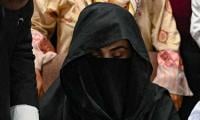Islamabad: According to the findings of the World Justice Project Report on The Rule of Law in Pakistan based on a Gallup Survey in urban Pakistan, 1 in 3 urban Pakistani men believe that a man has the right to hit his wife if she misbehaves.
The survey was conducted between May and September in 2017 though face-to-face interviews in 2,010 households. The households were distributed proportionally across the five urban areas of Faisalabad, Karachi, Lahore, Peshawar, and Quetta.
Under this survey, respondents were questioned regarding their views on domestic violence to highlight the difference between the mindset of men and women. The question was; “Would you agree with the statement that a married man has the right to hit his wife is she misbehaves?”
Answering this question, 31 per cent men agreed that a married man has the right to hit his wife if she misbehaves, while only 20 per cent women agreed with this statement. The report issued by Gallup Survey says that ‘such high support of domestic violence is alarming in a country where every day women fall victim to physical abuse at home for reasons as obnoxious as not making round chapatti.”
Social mindset is considered to be the biggest reason for high number of reported cases of violence against women in Pakistan. According to Punjab Gender Parity Report, in 2017 alone, as many as 8,882 cases of violence against women were reported only in Punjab with a 21.5 per cent increase in cases registered in 2016. The highest number of up to 1,000 cases of violence against women was reported in Lahore followed by 756 in Muzaffargarh.
The State of Human Rights Report 2017 of Human Rights Commission of Pakistan, in total, more than 5,660 crimes were reported against women in Pakistan’s four provinces during the first ten months of 2017. The report terms reported cases of violence against women ‘tip of the iceberg,’ as in most of the areas, especially in rural areas, such cases largely remain unreported due to conservatism, illiteracy, fear of stigma, shame and dishonour, and poverty.
Another survey results show that more than half Pakistanis opine that they have religious (87 per cent), media (66 per cent) and political (64 per cent) freedoms in Pakistan. It is also worth noting that the statistics for religious freedom relative to 2016 has increased by a considerable amount (20 per cent). Meanwhile, the statistics for political and media freedom has increased since the past year by 5 per cent and 6 per cent respectively.
Another survey around question “If we are at war with any other country, we can win?” nearly two third (70 per cent) Pakistanis were optimistic that if Pakistan is at war with any other country, it can win. Around 19 per cent disagreed to the statement whereas 11 per cent did not know or did not wish to respond.
This article reflects on key sporting moments, featuring Pakistan’s triumphs and shortcomings throughout 2024
JUIF’s legal adviser, Senator Kamran Murtaza, is also engaged in consultation process
Sit-in Action Committee decides to call a grand jirga for recovery of Muasawar Kakar
Abbasi says that neither government nor opposition sincerely intended dialogue







